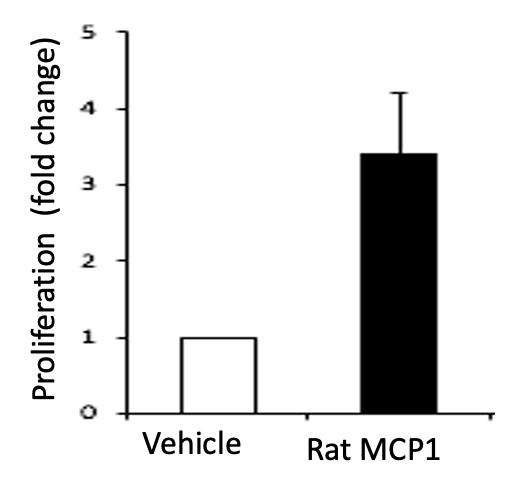Recombinant Rat CCL2/JE/MCP-1 Protein Summary
Product Specifications
Gln24-Asn148
Analysis
Product Datasheets
3144-JE (with carrier)
3144-JE/CF (carrier free)
Carrier Free
CF stands for Carrier Free (CF). We typically add Bovine Serum Albumin (BSA) as a carrier protein to our recombinant proteins. Adding a carrier protein enhances protein stability, increases shelf-life, and allows the recombinant protein to be stored at a more dilute concentration. The carrier free version does not contain BSA.
In general, we advise purchasing the recombinant protein with BSA for use in cell or tissue culture, or as an ELISA standard. In contrast, the carrier free protein is recommended for applications, in which the presence of BSA could interfere.
3144-JE
| Formulation | Lyophilized from a 0.2 μm filtered solution in PBS with Trehalose and with BSA as a carrier protein. |
| Reconstitution | Reconstitute at 100 μg/mL in sterile PBS containing at least 0.1% human or bovine serum albumin. |
| Shipping | The product is shipped at ambient temperature. Upon receipt, store it immediately at the temperature recommended below. |
| Stability & Storage: | Use a manual defrost freezer and avoid repeated freeze-thaw cycles.
|
3144-JE/CF
| Formulation | Lyophilized from a 0.2 μm filtered solution in PBS with Trehalose. |
| Reconstitution | Reconstitute at 100 μg/mL in sterile PBS. |
| Shipping | The product is shipped at ambient temperature. Upon receipt, store it immediately at the temperature recommended below. |
| Stability & Storage: | Use a manual defrost freezer and avoid repeated freeze-thaw cycles.
|
Background: CCL2/JE/MCP-1
Rat CCL2 is a member of the beta (C-C) subfamily of chemokines that is a chemoattractant for monocytes and basophils but not eosinophils or neutrophils (1-4). Rat CCL2 is secreted as a 14 kDa glycoprotein monomer (5) but noncovalent dimers probably occur (1). The first five amino acids of the mature protein are essential for activity; deletion of the N-terminal glutamine, which is pyrrolidone carboxylic acid-modified, dramatically decreases activity on basophils and, surprisingly, stimulates eosinophil chemotaxis (4). The rat CCL2 propeptide shares 82% amino acid (a.a.) identity with mouse CCL2 over the 148 a.a. sequence and 57%, 52%, 52%, 52% and 52% a.a. identity with equine, human, porcine, canine and guinea pig CCL2, respectively, over the first 100 aa. Rat and mouse CCL2 have a 49 aa extension at the C-terminus as compared to human CCL2. Fibroblasts, tumor cells, smooth muscle cells, endothelial cells, and mononuclear phagocytes can produce CCL2 either constitutively or upon mitogenic stimulation. CCL2 is best known as a chemotactic agent for mononuclear cells. It also induces enzyme and cytokine release by monocytes, NK cells and lymphocytes, and histamine release by basophils, primarily due to interaction with CCR2 receptors on these cells. Additionally, it is believed to reduce IL-12 production by dendritic cells and promote a Th2 phenotype in CD4+ T cells. The role of CCL2 in recruiting monocytes to sites of inflammation is implicated in the pathology of multiple sclerosis, atherosclerosis and allergic asthma (6).
- VanCoillie, E.V. et al. (1999) Cytokine Growth Factor Rev. 10:61.
- Luther, S.A. and J.G. Cyster (2001) Nat. Immunol. 2:102.
- Lu, B. et al. (1998) J. Exp. Med. 187:601.
- Weber, M. et al. (1996) J. Exp. Med. 183:681.
- Yoshimura, T. et al. (1991) Biochem. Biophys. Res. Commun. 174:504.
- Daly, C. et al. (2003) Microcirculation 10:247.
Citations for Recombinant Rat CCL2/JE/MCP-1 Protein
R&D Systems personnel manually curate a database that contains references using R&D Systems products. The data collected includes not only links to publications in PubMed, but also provides information about sample types, species, and experimental conditions.
7
Citations: Showing 1 - 7
Filter your results:
Filter by:
-
Effects of adipokine administration to the hypothalamic preoptic area on body temperature in rats
Authors: H Tsushima, K Yamada
J. Pharmacol. Sci., 2020-07-10;0(0):.
Species: Rat
Sample Types: In Vivo
Applications: In Vivo -
Serum IgG-induced microglial activation enhances neuronal cytolysis via the NO/sGC/PKG pathway in children with opsoclonus-myoclonus syndrome and neuroblastoma
Authors: X Ding, W Yang, Q Ren, J Hu, S Yang, W Han, J Wang, X Wang, H Wang
J Neuroinflammation, 2020-06-16;17(1):190.
Species: Rat
Sample Types: Whole Cells
Applications: Bioassay -
A Crucial Role of CXCL14 for Promoting Regulatory T Cells Activation in Stroke
Authors: HT Lee, SP Liu, CH Lin, SW Lee, CY Hsu, HK Sytwu, CH Hsieh, WC Shyu
Theranostics, 2017-02-08;7(4):855-875.
Species: Rat
Sample Types: Whole Cells
Applications: Bioassay -
T-Lymphocytes Traffic into the Brain across the Blood-CSF Barrier: Evidence Using a Reconstituted Choroid Plexus Epithelium.
Authors: Nathalie Strazielle, Rita Creidy, Christophe Malcus, José Boucraut, Jean-François Ghersi-Eg
PLoS ONE, 2016-03-04;0(0):1932-6203.
Species: Rat
Sample Types: Whole Cells
Applications: Bioassay -
Minocycline, a microglial inhibitor, blocks spinal CCL2-induced heat hyperalgesia and augmentation of glutamatergic transmission in substantia gelatinosa neurons.
Authors: Huang C, Chen Y, Li A, Lu J, Wang H
J Neuroinflammation, 2014-01-10;11(0):7.
Species: Rat
Sample Types: In Vivo
Applications: In Vivo -
Cytomegalovirus CC chemokine promotes immune cell migration.
Authors: Vomaske J, Denton M, Kreklywich C, Andoh T, Osborn J, Chen D, Messaoudi I, Orloff S, Streblow D
J Virol, 2012-08-22;86(21):11833-44.
Species: Rat
Sample Types: Whole Cells
Applications: Bioassay -
CXCR4 chemokine receptor signaling mediates pain hypersensitivity in association with antiretroviral toxic neuropathy.
Authors: Bhangoo SK, Ren D, Miller RJ, Chan DM, Ripsch MS, Weiss C, McGinnis C, White FA
Brain Behav. Immun., 2007-02-09;21(5):581-91.
Species: Rat
Sample Types: Whole Cells
Applications: Bioassay
FAQs
No product specific FAQs exist for this product, however you may
View all Proteins and Enzyme FAQsReviews for Recombinant Rat CCL2/JE/MCP-1 Protein
Average Rating: 5 (Based on 2 Reviews)
Have you used Recombinant Rat CCL2/JE/MCP-1 Protein?
Submit a review and receive an Amazon gift card.
$25/€18/£15/$25CAN/¥75 Yuan/¥2500 Yen for a review with an image
$10/€7/£6/$10 CAD/¥70 Yuan/¥1110 Yen for a review without an image
Filter by:






